A federal government shutdown has placed a stranglehold on Florida’s busy real estate market, especially in flood-prone regions. With critical federal services suspended, buyers and sellers alike face uncertainty as transactions halt due to gaps in essential programs like flood insurance.
Key Takeaways
- The federal shutdown has stopped new and renewal National Flood Insurance Program (NFIP) policies, impacting closings.
- Florida holds the most NFIP policies nationwide, making it especially vulnerable to disruptions.
- Lenders in flood zones often require proof of flood insurance, pausing many home purchases.
- Alternative and private insurance options exist but don’t cover everyone.
- Real estate leaders warn delays could worsen if the shutdown extends.
Impact on Florida’s Housing Market
The lapse in federal funding has immediate effects, particularly in regions where flood insurance is mandatory for securing a mortgage. In Florida—home to 18% of all NFIP policies nationwide—the expiration of the program means many property transactions cannot move forward. Lenders remain cautious, reluctant to approve loans on properties in special flood hazard areas without the backing of federal insurance.
Existing NFIP policies stay active until their natural expiration, but no new or renewed coverage can be issued until Congress reinstates funding. Buyers caught in the transition period find themselves waiting, their sales frozen until the government resumes normal activity.
How Realtors and Insurers Are Responding
The uncertainty has prompted some temporary solutions. State-backed Citizens Property Insurance has relaxed proof-of-flood-insurance requirements during the lapse, but this may only offer short-term relief. Meanwhile, private insurers such as those supported by Lloyd’s of London continue business as usual, but not all properties qualify for their coverage.
In addition, the process known as “assignment of policies” allows some buyers to transfer existing NFIP policies from sellers, though this isn’t feasible for all transactions.
Broader Impacts Beyond Flood Insurance
The shutdown’s effects ripple through other real estate sectors. The US Department of Agriculture has suspended new loans and guarantees, directly delaying rural property sales and developments. While the Federal Housing Administration is still endorsing most mortgages, backlogs and staffing shortages threaten to slow operations, particularly for condo approvals and housing assistance programs.
Fannie Mae and Freddie Mac have remained functional; however, the inability to verify data from federal systems—such as tax records—may bottleneck loan processing. Transactions in flood zones still require insurance, further compounding the shutdown’s impact.
Outlook for Buyers and Sellers
Despite the chaos, industry leaders are cautiously optimistic that most sales will go through when the government reopens. If the shutdown is short-lived, many believe real estate activity in Florida will rebound swiftly—though a prolonged impasse raises the stakes for all involved.
For now, patience and flexibility are advised. Buyers, sellers, and agents are encouraged to stay informed and work closely with lenders and insurers to navigate the evolving landscape. The coming weeks will be crucial in determining just how significant the real estate market slowdown will be across the Sunshine State.
Sources
- Impact of Government Shutdown on Real Estate in SWFL | Real Estate, Gulfshore Business.
- Florida real estate could take a hit during government shutdown, Tampa Bay Times.
- Shutdown’s Impact on Real Estate Programs, | Florida Realtors.


